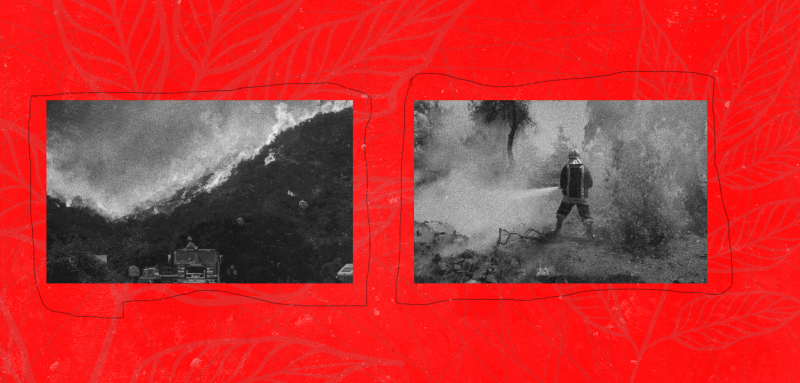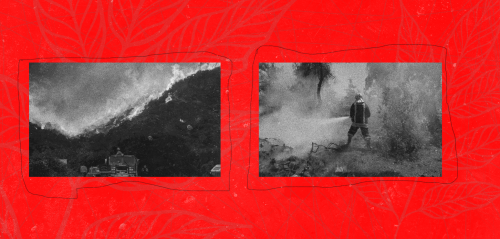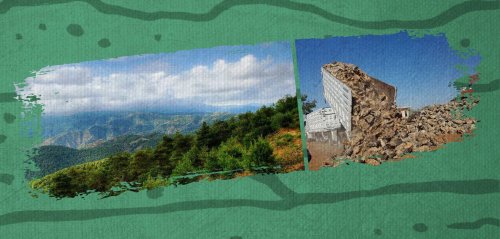“I can’t forget how we were surprised by the flames suddenly devouring the forests in the mountain, and how it spread so quickly. We were unable to do anything since we did not have the necessary equipment to fight the fires, and the incident happened without warning. Four and a half days went by as we watched the sight of the flames turn the green foliage that used to be a delightful sight to behold, into black ash that would sadden and break one’s heart.”
With these words, which were overcome by heartbreak and sorrow, Tijani, the general supervisor of the forest rangers of Mount Bargou (also ‘Djebel Bargou’) in the Siliana governorate, northwest of Tunisia, which witnessed a massive fire last August that destroyed about 1,500 hectares. He adds to Raseef22 that following great efforts, the fire was controlled with massive difficulty and with divine help as the rain fell, as if the Lord had responded to the cries and prayers of the people.
“I can’t forget how we were surprised by the flames suddenly devouring the forests in the mountain, and how it spread so quickly.”
But the toll is heavy, as he says, “Hundreds of hectares of Aleppo pine, rosemary, wild juniper, cork, beech, and other trees have been devoured by fire, and it will not be easy to restore them for several reasons. Aleppo pine needs large amounts of rain over at least four years to grow back and strengthen, and this is difficult in light of the decline in rainfall and increasing high temperatures. Moreover, the rapid multiplication and spread of these trees is usually achieved by the fall of pine kernels on the ground, and their random distribution to later turn into new shrubs, and this will not be possible after the flames consumed such a large number of trees. We will have to wait many years for the new trees to grow.”
Speaking on the other environmental hazards caused by the fires, Tijani adds, “There is also spring water that comes down from the mountain, and the trees used to absorb it, while the rest of the plants and herbs help settle it in the forest, thus making it always hydrated. But after the fire happened, the water now flows down quickly without stopping, and flows away uselessly. The notion of water pollution also exists due to the residue of the fires. As for the animals, some of them will return even if after a while, like wolves, because they are the kind that stay familiar with their region, but other animals may not return, because on the one hand they lost the green space that used to attract them, and on the other hand they no longer feel safe, and this would lead to the place losing its uniqueness.”
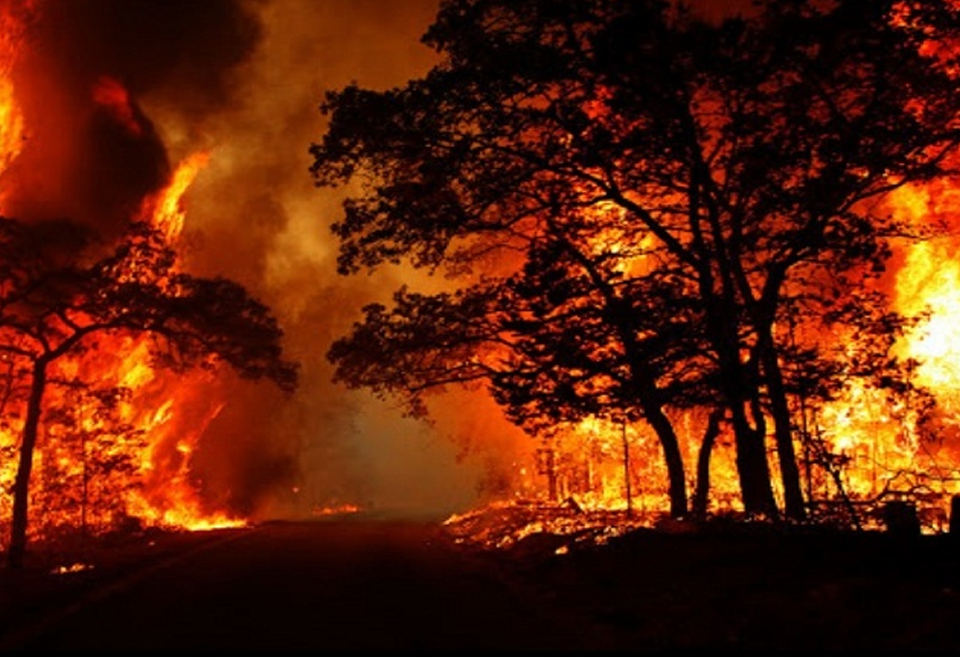
“Cause for concern”
A report issued by the United Nations Environment Assembly confirms what Tijani has said. It stated that forest fires generate black carbon and other elements that can pollute water sources, promote the melting of glaciers, cause landslides, and turn carbon sinks such as rainforests into carbon sources.
This year, Tunisia witnessed a large wave of fires, which recurred during the summer, and expanded to include many areas of the country, causing damage to important areas of forest and plant foliage, and inflicting damage to animals. This wave has raised serious concerns about its negative effects on the ecosystem and biodiversity, especially since the rates of fires have increased in recent years and have become a cause for serious concern.
Tunisia recorded 255 forest fires across the country’s governorates, destroying more than 5,317 hectares, an increase of 11% from a year ago. Agricultural crop fires amounted to 352 fires that destroyed about 620 hectares, an increase of 9% from last year, in the period from the beginning of January 2022 to mid-September, according to the estimates of the civil protection spokesman, Brigadier General Moez Taria’a, while speaking to Raseef22.
Hundreds of hectares of trees have been devoured by fire. It won't be easy to restore them. Aleppo pine needs large amounts of rain over at least four years to grow back and strengthen, and this is difficult in light of the decline in rainfall and high temperatures
The most dangerous fire this year was that one that broke out in the mountain range extending from Mount Bou Kornine (Jebel Boukornine) to Mount Borj Cédria in the northeastern Tunisian governorate of Ben Arous last July, leaving burned areas estimated to hold 533 hectares of forests of juniper, Aleppo pine, and several others, along with the Mount Bargou fire that lasted for five days starting last July, which resulted in huge losses from forest and fruit trees to animals such as wild rabbits, reptiles, wolves, pigs, bees, and birds.
According to the civil protection spokesman in Tunisia, Moez Taria’a, humans are the biggest cause of the outbreak of fires, whether deliberately or in unintentional accidents. He confirmed in a statement to Raseef22, that only 4 percent of the causes of fires are natural factors represented by the rise in temperatures to record levels due to the impact of climate change, while the other 96 percent of them are human factors.
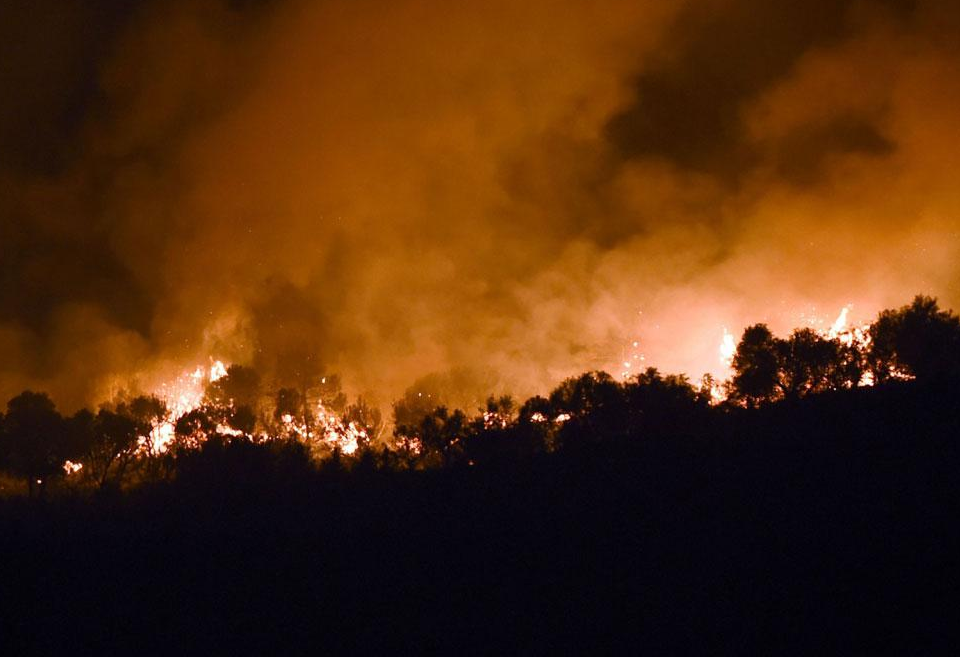
“A real disaster”
Fires are eroding forest spaces in Tunisia, and threaten the environment and air due to the toxic secretions they produce, which negatively affect human health, especially those living in close proximity to burnt forests. They also threaten the continuity of animal wealth, which consists mainly of pigs, rabbits, and birds.
This fear is felt by Nisreen al-Barqawi, a farmer near Mount Bargou. A part of her land and olive trees were burned, and she cannot even comprehend what had happened with the many forests that were devoured by fire near her home.
Wildfires cause loss of animal wealth, because some animals lose their homes and leave without return
She tells Raseef22, “The fire was the most horrific scene I have ever come across in my entire life. Suddenly, the great green mountain, whose trees and plants I used to lie in during my times of joy and sorrow since I was a child, turns pitch black. It is a real disaster. We lost an irreplaceable source of fresh air, and overnight we found ourselves inhaling the smoke and the smell of ash from the burnt trees, after the scents of wreath, juniper, and pine used to bring color to our days.”
Nisreen adds that the residents of these areas today do not know how they will be ever able to replace that treasure, and wonders what diseases will plague them as a result of the black smoke that lasted for days, “When we went to check how things were after putting out the fire, the smell of smoke and fire filled the place, and this frightened me a lot because I realized that wildfires cause diseases with symptoms that appear years later, which neither the people nor the authorities are aware of.”
She notes sadly that for the first time she does not see wild rabbits running before her, nor does she hear birds on the treetops. “Even the reptiles and wolves that used to scare me, I wish they are now in their green dens, but alas they have all become ash. It all suddenly disappeared.”
Scientific reports confirm Nisreen’s concerns. According to the European Commission, forests provide crucial environmental services, such as protecting biodiversity and providing oxygen, contributing to the continuation of vital services that sustain life support on Earth’s surface. The loss of insects and parasites would weaken the food chain, as insects matter because they are food for larger animals such as birds, bats, and reptiles, and they perform other services such as pollination, pest control, and the recycling of nutrients.
A recent study by researchers from Monash University in Australia, published in the journal The Lancet Planetary Health, revealed that micropollutants from wildfires are among the reasons for the increase in mortality rates, contributing to heart and lung disease.
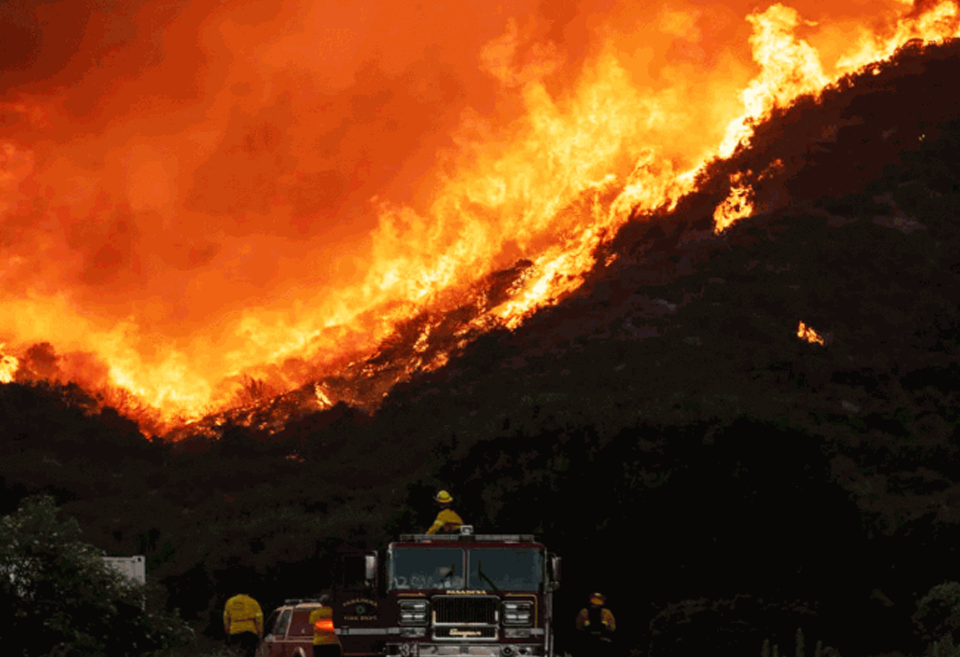
Years and years of restoration
Environmental expert Abdelmadjid Dabbar believes that fires in Tunisia are seriously threatening to erode forest wealth. He explains to Raseef22, “Scientifically, we need 10 to 20 years to be able to restore the burned forests, depending on the type of forest, but in no way can they return to their former state. Despite years of fires that have affected some forests in Tunisia, they remain the same as the day they were burned, while some others have begun to grow back, but in a fragile form that can be easily damaged, whereas the old trees, due to their age, are deep and strong.”
According to Dabbar, this is due to climatic conditions, as the trees that were burnt have reached such rigidity in addition to a balanced and full growth due to the abundant rainfall, in contrast to an average and weak rate of precipitation in recent years. Other plants can grow from it spontaneously, but without restoring the lost environmental value of the trees that have been burned. The state will be facing a difficult task, especially since Tunisia’s forests protect the soil from erosion and desertification and provide more rainfall, and their loss or non-return will be a serious indicator.
“When we went to check after putting out the fire, the smell of smoke and fire filled the place, and this scared me because I realized that wildfires cause diseases with symptoms that appear years later, which neither the people nor the authorities are aware of”
While there are still opportunities for forest growth to return — even years later — forest fires, according to the expert, cause a loss of animal wealth, because some animals lose their homes and with them their sense of security, so they leave and do not return even when the forest recovers.
For his part, the environmental expert stressed the importance of the monitoring process, applying the law against violators, and establishing a satellite surveillance system, as well as improving the status of the forest management apparatus and guards, because their situation is dire and they work with simple capabilities.
Necessary steps
With the sheer number of fires ravaging Tunisia’s forests, the situation requires a series of solutions and steps.
First, the Tunisian authorities should pay serious attention to the importance of providing advanced equipment capable of controlling fires in a short period of time and overcoming the weak logistical capabilities that prolong fires.
Secondly, in light of all indications that humans are one of the most prominent causes of the outbreak of fires, it is necessary to increase the number of forest rangers, and train them on how to cope with forest disasters, especially since the current number of forest rangers is only at 7,455 aides, with a rate of one ranger per 500 hectares, while the minimum required rate is one ranger for every 200 hectares.
Authorities in Tunisia are also being called upon to expedite the reforestation of the burned forest areas, to ensure the return of normal life to these areas as soon as possible and to avoid their desertification.
Raseef22 is a not for profit entity. Our focus is on quality journalism. Every contribution to the NasRaseef membership goes directly towards journalism production. We stand independent, not accepting corporate sponsorships, sponsored content or political funding.
Support our mission to keep Raseef22 available to all readers by clicking here!
Interested in writing with us? Check our pitch process here!
